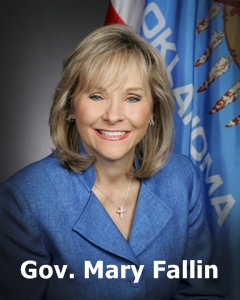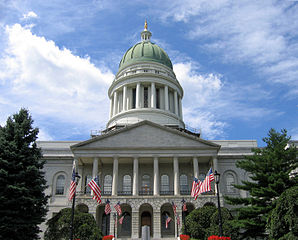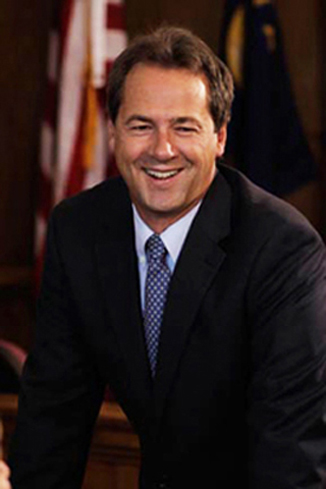November 27, 2017 •
Oklahoma Special Session Adjourns, Governor Vetoes Passed Budget Legislation
The Oklahoma Legislature adjourned an eight-week special session on Friday, November 17, after the Senate gave final approval on legislation to balance the state’s budget. Just hours after the session ended, Gov. Mary Fallin line-item vetoed most of the budget […]
 The Oklahoma Legislature adjourned an eight-week special session on Friday, November 17, after the Senate gave final approval on legislation to balance the state’s budget.
The Oklahoma Legislature adjourned an eight-week special session on Friday, November 17, after the Senate gave final approval on legislation to balance the state’s budget.
Just hours after the session ended, Gov. Mary Fallin line-item vetoed most of the budget bill’s provisions citing a failure to address the requests she made in calling the session and the lack of a long-term solution to re-occurring budget deficits. Provisions temporarily preserving funding for crucial health and human services were retained as the state continues to seek a solution.
The vetoed bill would have used cash reserves and made deep cuts to funding across all state agencies to close the $215 million hole in the state budget.
Gov. Fallin said she intends to call a second special session of the Legislature to come up with long-term funding solutions.
November 17, 2017 •
NYCU Video Digest – November 17, 2017
Let Becky take you through a busy week in government and ethics news in this week’s video digest!
Let Becky take you through a busy week in government and ethics news in this week’s video digest!
November 16, 2017 •
Montata Special Session Adjourns
The Montana Legislature adjourned a special session on the state’s budget shortfall in the early hours on Thursday morning. Multiple bills were passed to close the $227 million gap including a bill requiring furloughs of state employees, changing the state liquor license […]
 The Montana Legislature adjourned a special session on the state’s budget shortfall in the early hours on Thursday morning.
The Montana Legislature adjourned a special session on the state’s budget shortfall in the early hours on Thursday morning.
Multiple bills were passed to close the $227 million gap including a bill requiring furloughs of state employees, changing the state liquor license lottery to an auction, and a bill to eliminate $13 million in block grants for school districts statewide. Tax increases proposed by Gov. Steve Bullock did not pass.
Legislators have said the passed budget solutions are far from perfect but avoid deeper cuts to crucial state agencies.
November 13, 2017 •
Alaska Senate Adjourns from Special Session
The Alaska Senate adjourned the fourth special session on November 10. However, on November 13 the House majority coalition announced plans to hold technical sessions until the special session ends November 21. A technical session will force the Senate to […]
 The Alaska Senate adjourned the fourth special session on November 10.
The Alaska Senate adjourned the fourth special session on November 10.
However, on November 13 the House majority coalition announced plans to hold technical sessions until the special session ends November 21.
A technical session will force the Senate to hold similar sessions because one body cannot adjourn without the other.
Lawmakers passed a criminal justice reform bill despite warnings from the Alaska Department of Law and ACLU that the measures are unconstitutional.
November 10, 2017 •
NYCU Video Digest – November 10, 2017
Becky recaps a busy week in elections and legislative sessions around the country!
Becky recaps a busy week in elections and legislative sessions around the country!
November 10, 2017 •
NYCU Video Digest – November 10, 2017
Becky recaps a busy week in elections and legislative sessions around the country!
Becky recaps a busy week in elections and legislative sessions around the country!
November 7, 2017 •
Maine Special Session Adjourns Sine Die
The first special session of Maine’s 128th Legislature adjourned sine die on November 6, 2017. The House sustained Gov. Paul LePage’s veto of a bill allowing and regulating the retail sale of recreational marijuana. Additionally, the bill to bring ranked-choice […]
 The first special session of Maine’s 128th Legislature adjourned sine die on November 6, 2017. The House sustained Gov. Paul LePage’s veto of a bill allowing and regulating the retail sale of recreational marijuana.
The first special session of Maine’s 128th Legislature adjourned sine die on November 6, 2017. The House sustained Gov. Paul LePage’s veto of a bill allowing and regulating the retail sale of recreational marijuana.
Additionally, the bill to bring ranked-choice voting law into constitutional compliance became law without the governor’s signature. Maine voters passed a ballot initiative approving ranked-choice voting in the November 2016 elections.
Ranked-choice voting ensures the winning candidate in a multicandidate race receives the majority vote because voters rank candidates in order of preference. If a candidate does not receive 50 percent of first-choice votes, then the lowest scoring candidate is eliminated and votes are retabulated.
The bill to bring ranked-choice voting into constitutional compliance delays the new system until 2021 and automatically repeals the law unless voters ratify a constitutional amendment authorizing the Legislature to determine the method the state Legislature and Governor are elected by December 1, 2021.
November 7, 2017 •
Hawaii Special Session Scheduled
The Hawaii Senate is scheduled to convene a two-day special legislative session on Tuesday, November 14, to confirm 4 judicial appointments. Choosing from a list of candidates selected by the Judicial Selection Committee, Chief Justice Mark E. Recktenwald appointed Jessi […]
 The Hawaii Senate is scheduled to convene a two-day special legislative session on Tuesday, November 14, to confirm 4 judicial appointments.
The Hawaii Senate is scheduled to convene a two-day special legislative session on Tuesday, November 14, to confirm 4 judicial appointments.
Choosing from a list of candidates selected by the Judicial Selection Committee, Chief Justice Mark E. Recktenwald appointed Jessi Hall to the First District Family Court Judge and Gov. Ige appointed Paul Wong, Matthew Viola, and Rowena Somerville to the First Circuit Court.
Each Circuit Court judge will serve a 10-year term while the Family Court appointment has a six-year term.
November 7, 2017 •
Montana Gov. Calls Special Session
Gov. Steve Bullock called the Legislature into a special session late Monday to address the state’s budget issues caused by an unforeseen drop in state revenue and costly wildfires. Gov. Bullock has been working with lawmakers for months to come […]
 Gov. Steve Bullock called the Legislature into a special session late Monday to address the state’s budget issues caused by an unforeseen drop in state revenue and costly wildfires.
Gov. Steve Bullock called the Legislature into a special session late Monday to address the state’s budget issues caused by an unforeseen drop in state revenue and costly wildfires.
Gov. Bullock has been working with lawmakers for months to come up with a plan to fix budgetary issues without calling a special session, but no agreement could be reached. Gov. Bullock released a list of cuts he would be willing to make to state agencies to help close the gap in revenue.
Smaller state agencies, including the Commissioner of Political Practices who oversees the state’s ethics, will see 10% cuts while larger agencies such as the Department of Corrections and the state university system will be burdened much less.
The special session is scheduled to convene November 14, 2017.
November 3, 2017 •
NYCU Video Digest – November 3, 2017
Jon Spontarelli is here with this week’s government and ethics news you can use from a busy week around the country!
Jon Spontarelli is here with this week’s government and ethics news you can use from a busy week around the country!
October 27, 2017 •
NYCU Video Digest – October 27, 2017
Let Becky give you this week’s Government and Ethics News You Can Use, and stick around for details on our annual donuts and cider sale on Halloween to benefit the United Way of Summit County!
Let Becky give you this week’s Government and Ethics News You Can Use, and stick around for details on our annual donuts and cider sale on Halloween to benefit the United Way of Summit County!
October 27, 2017 •
News You Can Use Digest – October 27, 2017
National: Black Executives Join Forces, Forming a PAC to Back Them Up New York Times – Kate Kelly | Published: 10/24/2017 Dozens of black executives and their spouses joined U.S. Sens. Cory Booker and Kamala Harris, as well as Eric […]

National:
Black Executives Join Forces, Forming a PAC to Back Them Up
New York Times – Kate Kelly | Published: 10/24/2017
Dozens of black executives and their spouses joined U.S. Sens. Cory Booker and Kamala Harris, as well as Eric Holder Jr., the former attorney general, for a private dinner in July in Bridgehampton, New York. Many attendees had long been part of an informal group of friends and associates who raised money for philanthropies or policy issues on an ad hoc basis. At the dinner, they decided it was time to use their wealth and stature in a more formal way. By early 2018, the group hopes to start a political action committee, creating a new fundraising model for corporate executives of color. The group would support candidates of any political party who fit the PAC’s agenda.
Russia’s Favored Outlet Is an Online News Giant. YouTube Helped.
New York Times – Daisuke Wakabayashi and Nicholas Confessore | Published: 10/23/2017
As investigators examine the scope and reach of Russian interference in American politics, the once-cozy relationship between RT and YouTube is drawing closer scrutiny. YouTube played a crucial role in helping build and expand RT, an organization the U.S. intelligence community has described as the Kremlin’s “principal international propaganda outlet” and a key player in Russia’s information warfare operations around the world. While Kremlin-aligned agents secretly built fake Facebook groups to foment political division and deployed hordes of Twitter bots to stoke criticism of Hillary Clinton, RT worked out in the open, bolstered by one of the largest online audiences of any news organization in the world and a prominent presence on YouTube’s search results.
Study: Despite changing demographics, the political playing field still tilts toward white men
Washington Post – Vanessa Williams | Published: 10/24/2017
Women are running for office in larger numbers in the run-up to the 2018 midterm elections, but most of them face formidable odds because of long-standing practices and attitudes that are more favorable to men. The Reflective Democracy Campaign study finds that despite the growing diversity within the U.S. population, 90 percent of elected officials, from the local to the national level, are white, and most are male. Even in some jurisdictions in which the majority of the residents are people of color, the elected leadership is dominated by whites. The report’s authors point to gatekeepers such as political parties and outside groups that provide financial and logistical support to candidates as more often working to maintain the status quo than helping to elect candidates more reflective of their communities.
Federal:
As G.O.P. Bends Toward Trump, Critics Either Give in or Give Up
New York Times – Jonathan Martin and Jeremy Peters | Published: 10/25/2017
Some observers see an existential threat to traditional Republicans as the Grand Old Party risks a longer-term transformation into the Party of Trump. President Trump’s brand of hard-edge nationalism is taking root within his adopted party, and those uneasy with grievance politics are either giving in or giving up the fight. Many of those who remain will have to accommodate the president to survive primaries from the pro-Trump right. The party establishment, Trump backers say, wants to govern as if the election never happened. “They still think the election was about Trump’s personality. It wasn’t. It was his ideas,” said Laura Ingraham, a pro-Trump talk show host.
Mueller Now Investigating Democratic Lobbyist Tony Podesta
NBC News – Tom Winter and Julia Ainsley | Published: 10/23/2017
Special Counsel Robert Mueller is investigating lobbyist Tony Podesta and the Podesta Group. Mueller, who is leading the investigation into Russia’s attempts to meddle in the U.S. election, is reportedly probing the firm to determine whether it violated the Foreign Agents Registration Act (FARA) in its work for the European Centre for a Modern Ukraine (ECMU). The non-profit ECMU was part of a public relations campaign run by former President Trump’s campaign chairperson, Paul Manafort, to support Ukraine’s reputation. Sources said the investigation into Podesta and his company began as more of a fact-finding mission about the ECMU and Manafort’s role in the campaign, but has now morphed into a criminal inquiry.
From the States and Municipalities:
Colorado: Cub Scout Is Exiled After Pressing Legislator on Guns and Race
New York Times – Christine Hauser | Published: 10/22/2017
A Cub Scout was forced out of his den after he strongly questioned a state lawmaker about her stance on gun control. Ames Mayfield, 11, was asked to leave the den, the groups Cub Scouts are organized in, after he pushed Colorado Sen. Vicki Marble about her stance on gun legislation and past comments she made about health issues among black people. Soon after the event, Marble met with the leader of the Cub Scout pack that includes Mayfield’s den. Afterward, the leader told Mayfield’s mother that he was upset over the questions on guns and Mayfield would have to leave that den.
Florida: City Manager Asked Lobbyist for Football Tickets
Tallahassee Democrat – Jeff Burlew | Published: 10/24/2017
Tallahassee City Manager Rick Fernandez asked a local lobbyist for four tickets to a Florida State University football game last year. The text exchange was delivered to the state ethics commission, which is investigating a complaint involving Fernandez. Florida’s ethics laws prohibit public officials from knowingly accepting, a gift from someone who lobbies the public official’s agency if he or she reasonably believes that the gift has a value over $100. The box seat football tickets, which had an estimated total value of about $2,000, were not included in Fernandez’s public gift disclosures. There is no indication in the texts that the city manager paid for the tickets.
Missouri: New Limits to Campaign Financing Confuse Missouri’s Political Candidates
St. Louis Public Radio – Jo Mannies | Published: 10/24/2017
Missouri candidates are grappling with the new restrictions to campaign donations mandated by Amendment 2. Voters approved the constitutional amendment in 2016, putting an end to the Missouri’s status as one of only a handful of states without donation limits. But flaws in the new system are prompting the General Assembly and political activists to seek more changes. The Missouri Ethics Commission, charged with enforcing the new law, has had its hands full. The panel has issued at least 15 different opinions addressing various provisions of Amendment 2. It is also in the middle of several lawsuits.
Montana: Donors Once Again Much More Limited in Contributions to Montana Candidates
Helena Independent Record – Amy Beth Hanson (Associated Press) | Published: 10/23/2017
The Ninth U.S. Circuit Court of Appeals reinstated Montana’s previous limits on the amount of money candidates can receive. In May 2016, a federal judge declared that Montana’s contribution limits were unconstitutional and voided those caps. That kicked the state back to amounts set before a 1994 initiative where voters lowered how much candidates could collect. The Ninth Circuit’s actions bring Montana back to the voter-approved limits. A summary of the court’s opinion said the panel found the limits “both justified by and adequately tailored to the state’s interest in combating quid pro quo corruption or its appearance.”
New York: Former Top Assembly Ethics Official: Position a ‘waste of money’
Albany Times Union – Chris Bragg | Published: 10/22/2017
In the wake of former Assembly Speaker Sheldon Silver’s indictment on fraud and extortion charges, his successor embarked on what seemed like a major reform. Speaker Carl Heastie was praised for conducting a nationwide search for the leader of the newly created Assembly Office of Ethics and Compliance. In September 2015, Heastie announced that Jane Feldman, a respected former top ethics official in Colorado, would lead the office. But only a few months after taking the position, Feldman began to doubt that Heastie was serious about reform. Looking back, Feldman regards her hiring in large part as a public relations move by the legislative chamber’s leadership.
New York: Reform Group Criticizes JCOPE’s Online Lobbying Filing System
Albany Times Union – Chris Bragg | Published: 10/24/2017
Reinvent Albany released a report calling the New York Joint Commission on Public Ethics’ (JCOPE) online lobbying filing system “antiquated and outdated.” The group says certain filings raise questions about whether information is accurately and completely reported. Former top state lobbying official David Grandeau, now a private attorney, also submitted comments on JCOPE’s proposed comprehensive lobbying regulations alleging that a number go beyond what is allowed in state law.
Pennsylvania: Irate Judge Gives Ex-Philly DA Seth Williams 5-Year Sentence in Bribery, Corruption Case
Philadelphia Inquirer – Jeremy Roebuck | Published: 10/24/2017
Former Philadelphia District Attorney Seth Williams, a career prosecutor who chased down municipal corruption but whose tenure was mired in a corruption scandal, was sentenced to five years in prison for accepting a bribe. “Your profound dishonesty has to be deterred,” U.S. District Court Judge Paul Diamond said before ordering that Williams be imprisoned immediately. An investigation into Williams’ financial affairs resulted in a wide-ranging indictment in which he was charged with accepting cash and gifts, fraudulently using thousands of dollars from his campaign fund for personal expenses, misusing city vehicles, and misappropriating money intended to fund his mother’s nursing home care.
South Carolina: Quinn’s State House ‘Tentacles’ Included Paying Lawmakers $1.3 Million, Judge Told
The State – John Monk | Published: 10/24/2017
For the first time, Solicitor David Pascoe laid out details of a much-rumored behind-the-scenes payoff scheme to buy influence at the South Carolina Legislature. Richard Quinn literally put lawmakers on the payroll of his consulting firm, working with now-former state Reps. Tracy Edge and Jim Harrison to peddle influence on certain legislation that would benefit his private industry clients. “[Quinn] used legislators, groomed legislators, and inspired legislators and others to violate multiple provisions of the state ethics act so they could all make money,” Pascoe told a judge.
Texas: Lawmakers Accept $1.5 Million While Passing Governor’s Agenda
Texas Monitor – Andrew McLemore | Published: 10/19/2017
During this summer’s special session of the Texas Legislature, the state’s top elected officials collected more than $1.5 million in campaign contributions. The lion’s share of those dollars went to Gov. Greg Abbott, who accepted nearly $900,000 during the two-month special session. State law prohibits campaign contributions during regular sessions but say nothing about accepting money during the special session. Some legislators see a conflict-of-interest in this practice and abstain. Most do not. Of the 183 officials involved in the legislative process, 103 reported campaign contributions during the special session.
Virginia: Ed Gillespie’s Lobbying Career Included Work for Firms with Vast Interests in Virginia
Washington Post – Beth Reinhardt | Published: 10/19/2017
If he is elected governor of Virginia, Ed Gillespie would face decisions in which the public’s interests may conflict with the interests of companies that have paid his firms millions of dollars collectively for lobbying and consulting services, and that could hire him again. Gillespie closed his consulting firm, Ed Gillespie Strategies, shortly before launching his campaign in January. The Republican nominee has no current financial interests in the companies, such as stock holdings, and he and his wife would put their personal investments in a blind trust if elected.
 State and Federal Communications produces a weekly summary of national news, offering more than 60 articles per week focused on ethics, lobbying, and campaign finance.
State and Federal Communications produces a weekly summary of national news, offering more than 60 articles per week focused on ethics, lobbying, and campaign finance.
October 26, 2017 •
North Carolina Adjourns Special Session
The General Assembly adjourned on October 17, after finishing a special session convening on October 4. The General Assembly overrode Governor Roy Cooper’s veto of Senate Bill 656, a bill canceling North Carolina’s judicial primaries next year. The Legislature will reconvene […]
 The General Assembly adjourned on October 17, after finishing a special session convening on October 4.
The General Assembly adjourned on October 17, after finishing a special session convening on October 4.
The General Assembly overrode Governor Roy Cooper’s veto of Senate Bill 656, a bill canceling North Carolina’s judicial primaries next year.
The Legislature will reconvene on January 10, 2018.
October 20, 2017 •
NYCU Video Digest – October 20, 2017
Time for your weekly recap of the government and ethics news you can use in this week’s video digest!
Time for your weekly recap of the government and ethics news you can use in this week’s video digest!
State and Federal Communications, Inc. provides research and consulting services for government relations professionals on lobbying laws, procurement lobbying laws, political contribution laws in the United States and Canada. Learn more by visiting stateandfed.com.

